A first look at Internet Business Methods Patents, Science, Technology and the Economy Program (STE) – Working Papers Series STE-WP-12
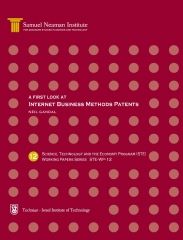
Despite the concerns about the proliferation of software and Internet business patents, there has been no systematic empirical research on Internet patents. In this project, I take a first-look at Internet patents. I examine whether there are systematic differences between Internet business method patents and other software patents in the same patent classes.
Is Venture Capital Special? Empirical Evidence from a Government Initiated Venture Capital Market, Science, Technology and the Economy Program (STE) – Working Papers Series STE-WP-9
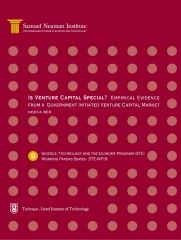
The financing extended by venture capital funds is examined in this paper, using a unique database that includes information about all the firms in the portfolio of all the Israeli venture capital funds in 1997-2000, and data on a control group of firms that were not backed by venture capital funds but were supported by […]
Conceiving New Industrial Systems: The Different Emergence Paths of the High-Technology Industry in Israel and Ireland, Science, Technology and the Economy Program (STE) – Working Papers Series STE-WP-11
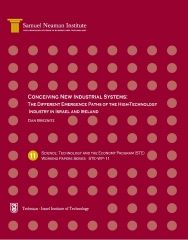
In the last decade, both Israel and Ireland have been on the forefront of a successful double revolution. In the international arena, the two small states have been the hotbeds of new technology based firms (NTBF) that establish themselves in global markets in the area of software and information technology, making the two states successful […]
The Military as a Public Space – The Role of the IDF in the Israeli Software Innovation System, Science, Technology and the Economy Program (STE) – Working Papers Series STE-WP-13
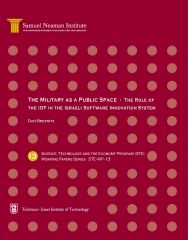
This paper focuses on the role played by the Israeli military (IDF) in creating and sustaining the highly innovative Israeli software industry. The IDF is often credited with a large role in the creation and sustained success of the Israeli high-tech industry. The paper analyze the activities and history of the IDF’s central computer unit, […]
Quantitative Growth Effects of Subsidies in a Search Theoretic R&D Modal, Science, Technology and the Economy Program (STE) – Working Papers Series STE-WP-16-2002
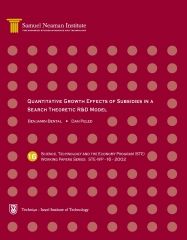
Should government subsidize R&D and does it matter how these subsidies are allocated? We examine these questions in a dynamic model where R&D is described as sequential sampling from a distribution of new ideas. Successful discoveries affect future available resources and incentives for further R&D. Consequently, there may be under-investment in R&D. We study the […]
The Determination of Success of R&D Projects: Evidence from American-Israeli Research Alliances, Science, Technology and the Economy Program STE-WP-8-2001
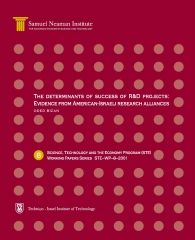
A basic premise of Israeli R&D support programs has been the principle of neutrality all eligible projects are funded. With a binding budget constraint, however, the government has to select the projects it funds and thus to depart from neutrality. An optimal departure would favor those projects that have less of a chance to succeed […]
Cooperation and Competition in R&D with Uncertainty & Spillovers, Science, Technology and the Economy Program STE-WP-6
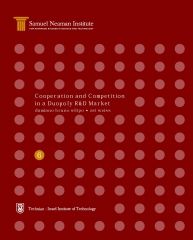
In a general setting with uncertainty and spillovers in R&D activity, we consider the incentive to cooperate among firms at any or all of the following three stages. Firms can jointly agree on the level of R&D expenditures, they can set up joint research facilities, and/or they can engage in an information sharing agreements, by […]
Defense R&D and Economic Growth in Israel: A Research Agenda, Science, Technology and the Economy Program STE-WP-4
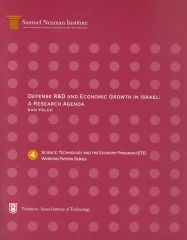
When evaluating Israel’s high-tech capabilities and impressive economic achievements since inception, it is difficult not to recognize the important role played by defense and military developments. In particular, defense-related R&D had significant impacts on, as much as it was aided by, Israel’s industrial sector, higher educational system in science and engineering, research community, and the […]
R&D, Subsidies and Productivity, Science, Technology and the Economy Program STE-WP-7
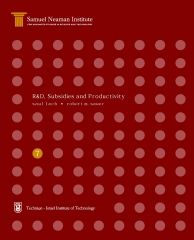
In this paper we formulate a model that extends the traditional theoretical literature on the optimal management of an R&D project by emphasizing the model’s empirical and policy implications. We solve the firm’s dynamic problem and use the resulting optimal R&D policy to assess the role of subsidies aimed at stimulating R&D activities. The theoretical […]
Sources of U.S. Longevity Increase, 1960-1997, Science, Technology and the Economy Program STE-WP-3
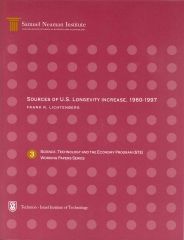
Between 1960 and 1997, life expectancy at birth of Americans increased approximately 10%–from 69.7 to 76.5 years—and it has been estimated tha t the value of life extension during this period nearly equaled the gains in tangible consumption. While life expectancy has tended to increase, there have been substantial fluctuations in the rate of increase. In […]
